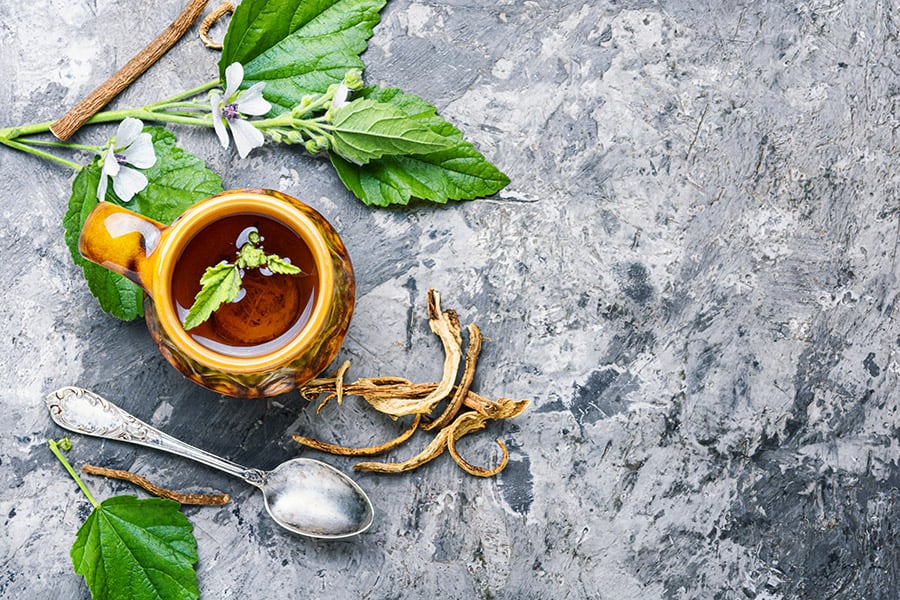Is there anything worse than an upset stomach? Thank goodness for all those herbs that can ease your digestive woes. The trouble is, not all herbs can be used to treat all tummy issues.
For example, we know that ginger is great for soothing nausea, but it can seriously aggravate ulcers because it’s a heating herb. Similarly, you don’t want to take marshmallow (which is moistening) to treat diarrhea.
Let’s take a look at some of the most common herbs for belly issues, and what they’re best suited for.
Choosing the Right Remedy
Whenever someone asks me which herb to take for an ailment, my response is always the same: what caused it? This is because what alleviates one condition may worsen another and vice versa.
When it comes to herbs for upset stomachs, nausea, and other belly issues, that reply is the same.
There are many different causes for digestive upsets, so there are different herbal remedies to soothe them. Remember that herbs have different energetics (heating, cooling, drying, moistening), and what works for one condition isn’t necessarily ideal for another.
1. Peppermint
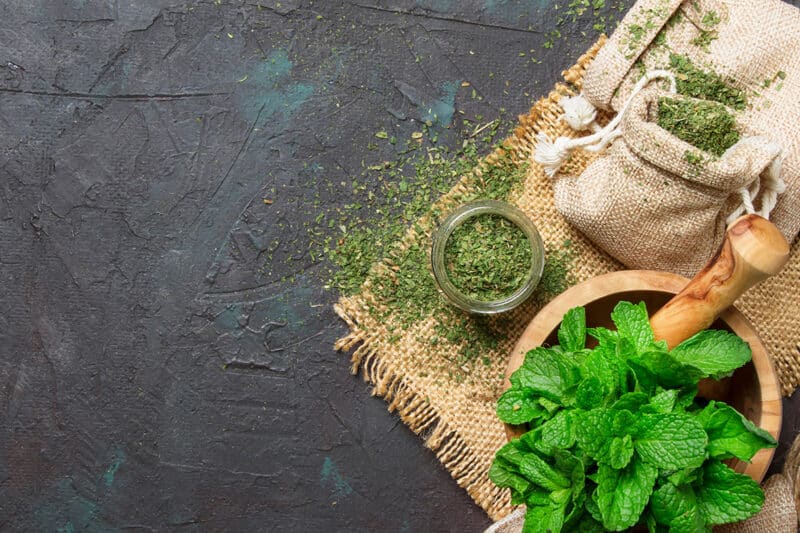
There’s a good reason why peppermint (Mentha x piperita) is a staple in medicinal gardens and herbal apothecary cabinets worldwide. It’s incredibly effective for soothing all kinds of stomach upsets, from nausea and gas to Crohn’s and celiac flare-ups.
Chances are you’ve had at least one cup of peppermint tea in your life so far, probably prepared for you as a child to soothe nausea or the stomach flu.
Peppermint works well for several gastro issues, as its antispasmodic properties can help to relax intestinal clenchings caused by IBS. It also has cooling and analgesic properties so it can lessen all kinds of gastro discomfort.
That said, peppermint can also be a stimulant: although it has cooling energetics, the menthol content can also be warming.
As a result, it can aggravate “hot” conditions such as heartburn and peptic ulcers. In fact, the same antispasmodic characteristics that relax intestinal cramps can also relax the esophageal sphincter.
When that happens, stomach acid can pour back into the esophagus. As you can imagine, it can exacerbate GERD or heartburn significantly.
2. Fennel
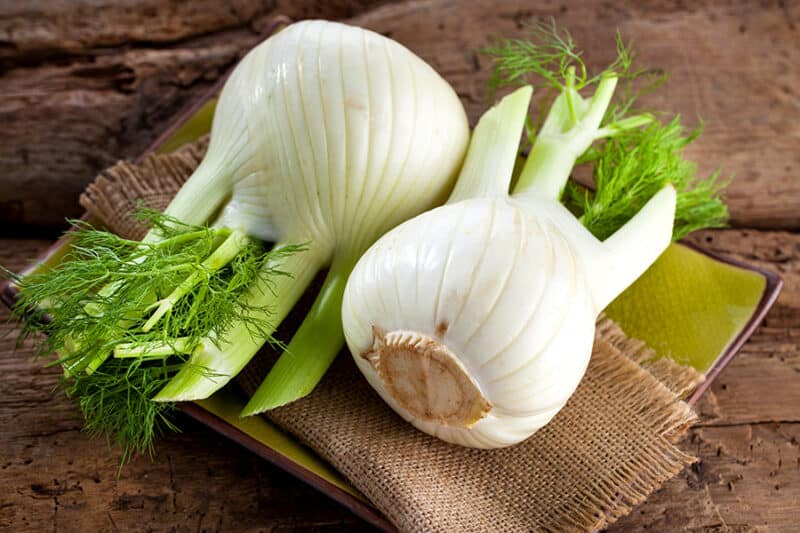
Are you familiar with the term “carminative“? Well, it refers to a substance that can erm… eliminate gas in the digestive system. When it comes to herbs for upset stomachs, it also refers to plants that can help prevent unwanted gas in the first place.
Fennel (Foeniculum vulgare) is surprisingly tasty and has a licorice flavor that’s a bit on the savory side. Its seeds have been added to baked goods for thousands of years, and its juicy bulb can be sliced or grated and eaten raw or cooked.
Chew fennel seeds to alleviate gas pain, nausea, bloating, or make an infusion (tea) with the seeds and/or leaf fronds.
This tea can also be taken to treat colic in babies (via breast milk) and stimulate the appetite in people dealing with shock and grief.
3. Anise Hyssop

If you like the taste of licorice, as with the fennel above, definitely add anise hyssop (Agastache foeniculum) to your medicinal herbs list. It’s another member of the mint family, so it has similar carminative properties.
That said, in addition to its ability to stop you from being a gaseous mess, it can alleviate the type of anxious tension that can cause indigestion.
Many people use anise hyssop as a flavoring agent for less tasty herbal concoctions. Its natural sweetness and licorice kiss make what would otherwise taste like a swamp significantly more palatable.
4. Raspberry Leaf

Raspberry leaves (Rubus idaeus) have antispasmodic and astringent properties that are ideal for calming lower belly spasms and diarrhea. When a plant is described as “astringent,” it means that it has drying actions.
If you’re dealing with a nasty bout of food poisoning, or if you have celiac disease and you’ve been glutened, try making a cup of equal parts peppermint and raspberry leaf tea (to create approximately 1 teaspoon per cup of water).
That should help dry things up nicely while calming the abdominal cramps.
5. German Chamomile

This beautiful little herb has several different actions that can benefit a variety of upset stomachs. It’s a member of the daisy family and has a beautiful, sweet, apple-like scent and flavor.
Chamomile (Matricaria recutita) is safe for children, and when mixed with anise hyssop, lemon balm, and catnip, it can create a tea that soothes gas and tummy aches in little ones.
In fact, this tea can be brewed a bit stronger and sipped by nursing mothers to alleviate colic in their babies.
*Note: People who are allergic to ragweed can react badly to chamomile as well. As such, if you have this allergy, try sipping just a tiny bit of weak chamomile tea at first to check your tolerance level.
6. Ginger
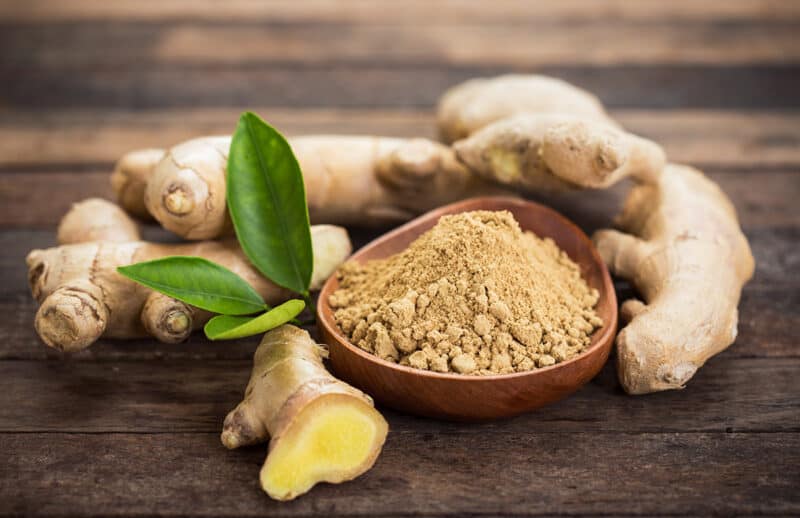
Ginger (Zingiber officinale) is one of the best herbs around for calming all kinds of upset stomachs. It contains gingerols and shogaols that counteract both queasiness and pain.
A mild ginger tea can work wonders for counteracting the morning sickness that women experience during pregnancy. If you find that you get motion sickness during car rides or flights, bring along ginger biscuits as snacks.
Remember that ginger has heating energy, so don’t take it if your gastro issues are hot in nature (heartburn, GERD, peptic ulcer, etc.). Otherwise, you’re adding heat to an already burning condition, and that’ll make things so much worse.
7. Catnip

Interestingly, the same herb that drives our feline friends into a frenzy can have such a calming effect on us. Like peppermint and fennel, catnip (Nepeta cataria) is a carminative herb that alleviates gas and bloating.
It’s also anxiolytic and hypnotic, which means that it can calm anxious, frayed nerves and help soothe you to sleep.
Try catnip tea or tincture if your roiling belly issues are caused by stress, anxiety, or grief.
8. Yarrow
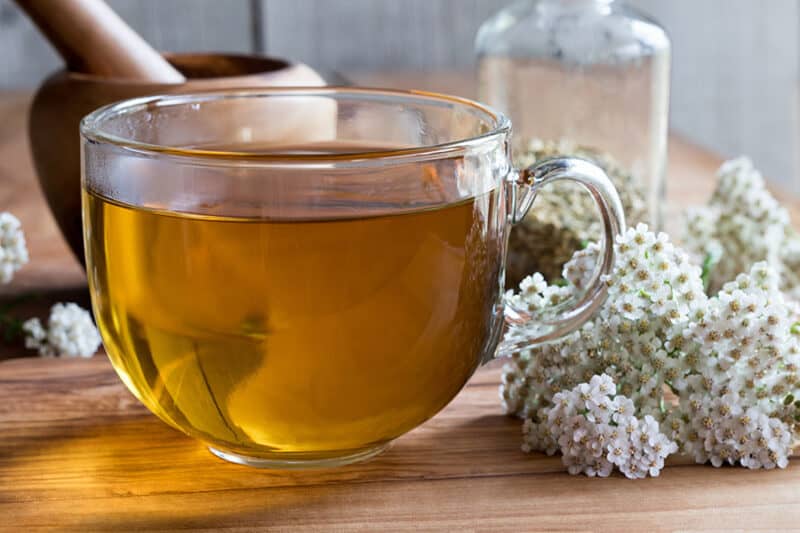
I love yarrow (Achillea millefolium). Honestly, if I had to choose a few favorites from my many plant allies, yarrow would probably be at the top of that list. Not only is it invaluable for staunching wounds, but it also has wondrous astringent properties.
These are spectacular for soothing various stomach upsets and issues, particularly those associated with gallbladder issues.
Additionally, yarrow’s anti-bacterial and anti-microbial properties make it effective for treating bacteria-caused food poisoning. It’s especially effective against E. coli, Salmonella, and the Helicobacter pylori bacteria known for causing stomach ulcers.
9. Licorice Root

Whereas peppermint can exacerbate hot conditions such as heartburn and GERD, licorice (Glycyrrhiza glabra) is known to alleviate them. It’s demulcent and moistening, just like marshmallow, so it also coats and protects delicate mucous membranes in the throat, stomach, and intestines.
This is why it helps to counteract that awful burn that happens when stomach acid bloops its way up into our throats.
Note that if you have low potassium, hypertension, or edema, you should only take licorice in small doses, as it can exacerbate these conditions. Also, consult with a healthcare practitioner before taking licorice root if you have kidney disease.
10. Lemon Balm

Another member of that magnificent mint family, lemon balm (Melissa Officinalis), is wonderful for all kinds of stomach upsets. Like its cousins, it has anxiolytic, antispasmodic, and carminative properties. As such, it’s good for treating the kind of dyspepsia (indigestion) caused by stress and anxiety.
As you can imagine, it also alleviates IBS flare-ups caused by those emotional upheavals as well.
Its anti-spasmodic properties can reduce menstrual cramps as well as lower abdominal/intestinal cramps caused by estrogen fluctuations. Best of all, its calming effects can also help you get a good night’s sleep while it’s easing your belly woes.
11. Meadowsweet
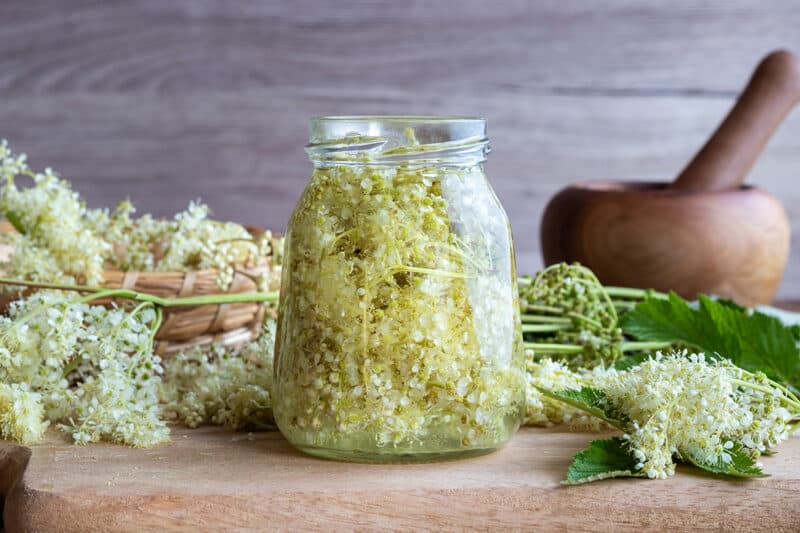
Meadowsweet, with its gentle medicinal actions and sweet flavor, is absolutely perfectly named. It’s often added to astringent preparations to counteract their “ugh” factor but is also effective on its own.
This herb is anti-inflammatory and has analgesic (painkilling properties). As a result, it’s great for soothing the kind of digestive issues caused by inflammation and chronic conditions. It can alleviate IBS and Crohn’s flare-ups, as well as peptic ulcers and heartburn.
12. Marshmallow Root
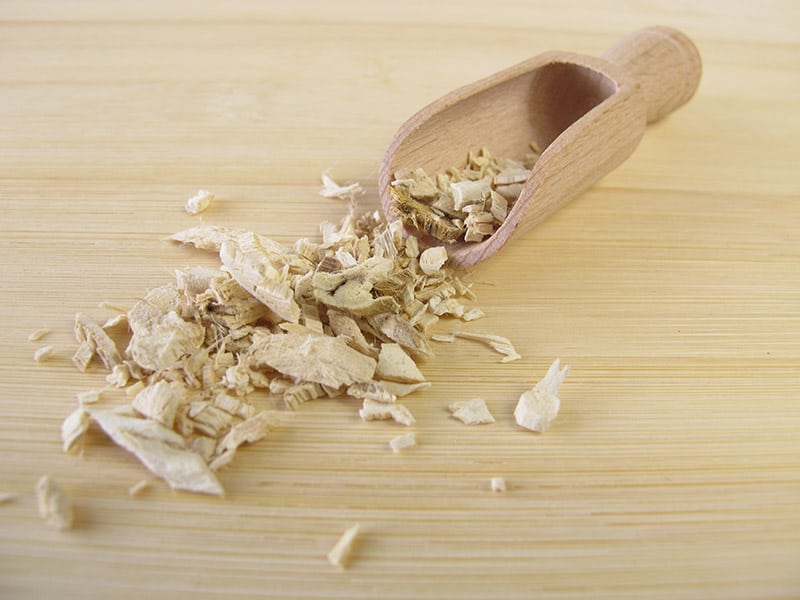
Marshmallow’s demulcent properties help it soothe upset stomachs and gastrointestinal issues with support and healing. Basically, because it’s mucilaginous, it creates a protective, moistening barrier along internal linings. This is why it’s so effective at soothing esophageal, stomach, and intestinal issues.
You can use marshmallow to calm the burn of acid reflux, and ease pain caused by peptic ulcers. It’s also great for irritable bowel syndrome, Crohn’s, celiac disease, and leaky gut syndrome.
Marshmallow’s hydrating components are also good for alleviating constipation.
Generally, if what you’re dealing with is inflammatory in nature, demulcent herbs like marshmallow and slippery elm (Ulmus rubra) can help to provide soothing relief.
Determine The Cause of Stomach Upsets: Don’t Just Treat Symptoms
As mentioned at the top of this article, it’s important to determine what’s causing stomach upsets, rather than just throwing remedies at them.
Remember that many conditions can have similar symptoms, so if you’re dealing with an issue for more than a few days, or if pain and discomfort are severe, consult with your healthcare provider.
Additionally, as with all medications—standard or herbal—it’s vital to do your research before taking anything. This way, you can determine potential negative reactions, contraindications with any prescriptions, or allergies.
Any of these herbs can help with upset stomachs, but only if you know what is causing your tummy issues.
